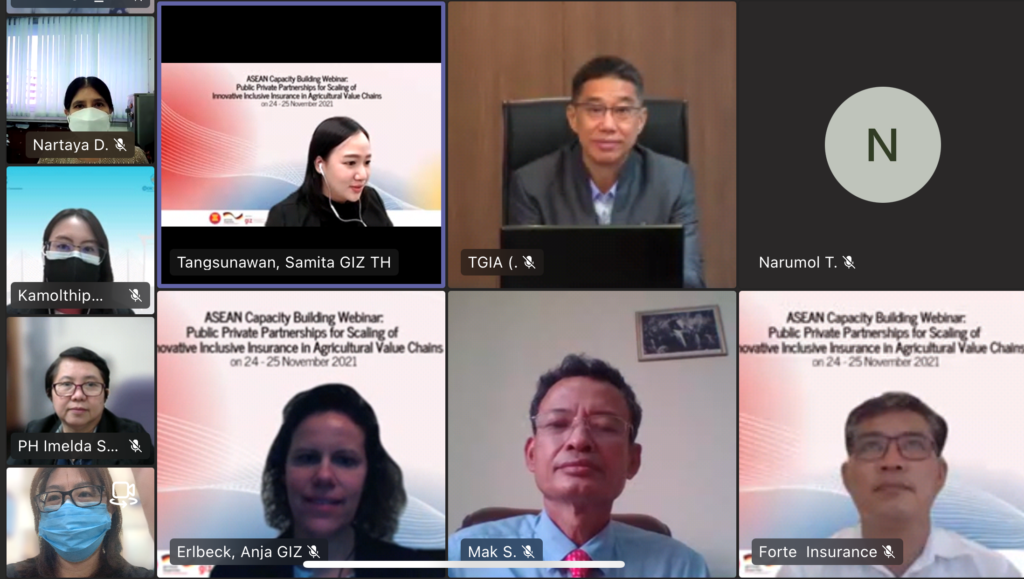Southeast Asia urgently needs innovation and strong network collaboration among public and private sectors to effectively manage increasing agricultural risk associated with climate change, experts say.

The urgency of managing financial risks for agricultural sector in the region was highlighted during the recent online workshop organised by the ASEAN Secretariat in collaboration with Deutsche Gesellschaft für Internationale Zusammenarbeit (GIZ) and the Microinsurance Network (MiN). Agricultural and financial experts and representatives from related public and private sectors discussed during the one and a half days online capacity building workshop in a bid to explore the role finance, innovations and technology, particularly in insurance, plays in addressing increasing agricultural risks associated with climate change.

For Southeast Asia, agriculture is a vital sector accounting for over 25% of GDP in some member countries. However, the region is at risk of facing more frequent natural disasters and extreme weather in the next century. Many scientific studies have shown that Indonesia, Thailand, Myanmar, Malaysia, Vietnam and the Philippines are among the most vulnerable to climate change.
“The MiN’s latest Landscape of Microinsurance Study shows five billion people worldwide remain exposed to little or no insurance. The same study also confirms climate change continues to accentuate an already existing problem which affects low-income populations disproportionately harder than the rest. This only highlights the urgency for us to prioritise building resilience by introducing public programmes, private offerings or a blend of public-private partnerships,” he said.
In the Philippines, for example, a series of natural disasters in 2020 included volcanic eruption, earthquake, tropical cyclones and super typhoons, which caused landslides and severe flooding. The damages wiped out over US$282 million worth of agricultural goods.
Public and private collaboration is needed in designing, developing and delivering effective and sustainable solutions to agriculture risk in climate change. Regional workshops are regarded as activities aimed at creating awareness and capacity building support through the sharing of lessons learned and best practices as well as fostering innovative solutions.
“No one sector can do it alone. Collaboration across industries and borders is critical and essential if we are to address the challenge. We owe it to the industry that provides food on our tables and nourishment for our bodies,” he said.

To cope with the additional pressure of climate change on ASEAN socioeconomic development and food security, member nations have adopted the ASEAN policy framework which recognises and emphasises the importance of strengthening climate and disaster resilience. Agriculture insurance is a crucial tool for transferring climate-related risk in agricultural sector. It can be served as one of the measures to address this regional challenge.
In respond to the need, the ASEAN Agriculture Working Group on Crops (ASWGC) conducted the Strategic Plan of Action for the ASEAN Cooperation in Agricultural Cooperative 2021-2025. A focus is on enhancing ASEAN capacity on crop insurance among member states. The working group recognises the importance of crop insurance while actively promoting implementation since 2017. Tangible action will enable ASEAN member states to enhance this knowledge and capacity on crop insurance.
To support the ASEAN Member States, GIZ has collaborated with the ASEAN Secretariat in developing the ASEAN Guideline on Agricultural Insurance Implementation. The draft Guideline is in the process of finalisation and will be proposed to ASWGC for approval tentatively by mid-2022.
ASEAN agriculture insurance landscape

In fact, agriculture insurance is not new in the region. Anja Erlbeck, GIZ Director of the Climate Risk Financing in Cooperation with ASEAN, said Philippines introduced national programme on crop, livestock and aquaculture insurance in 1980s. Large-scale schemes are operated in Thailand, Philippines and Indonesia.
Premium subsidies and credit linkage are key factors in scaling agriculture insurance in the value chain. Bundling with non-financial products such as fertilisers is other potential for scaling agriculture insurance package.
She foresaw trends and innovations in the region. Priority is given to index-based products, increased interest by the private sector in operating schemes but also in promoting insurance to reduce risk in agricultural value chain and testing of technologies

Kheedej Anansiriprapa, Thai General Insurance Association Executive Director and Chairman of the ASEAN Agricultural Insurance Working Group of ASEAN Insurance Council, said the group provided a platform for the agriculture, insurance and related stakeholders in the region to have a constant dialogue, exchange information and sharing best practices among member nations to foster agricultural insurance development.
He also shared his experience in working with the Thai government on implementing crop insurance top up scheme, which up to 40 insurers voluntary joined force in driving the national programme.
“Private companies cannot run agriculture insurance alone without strong political will,” he said during the online meeting.
Youk Chamroeunrith, Group CEO of Forte Insurance in Cambodia, also shared experiences of pilot tests on weather index, soil moisture and yield index insurances during 2015-2021. He also mentioned that satellite technology could play important roles in accessing the index insurances.
Participants also discussed outlook and opportunity for future joint actions in ASEAN through the innovative agricultural insurance to promote resilient agricultural value chains. The one and a half days webinar was concluded with the common agreement to achieve the joint actions within ASEAN on the innovative, inclusive insurance for sustainability of the agriculture sector and food security in the long run.


